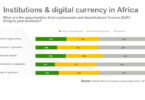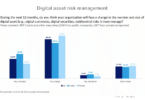Deloitte published an article that explores five potential barriers to the adoption of blockchain by enterprises. They address the progress that has been made so far in each of the areas. Below is a summary.
Scalability and performance
Compared to conventional databases, blockchains are slow because separate servers have to agree on transactions. The report quotes typical public blockchain Bitcoin and Ethereum performance rates of seven and fifteen transactions per second respectively.
Private blockchains tend to be faster, but are still far slower than relational databases. However, there is ongoing innovation in consensus mechanisms which show promise. Perhaps one of Deloitte’s most important points is that each consensus mechanism may be more or less suitable depending on the application.
Another area of progress is sharding where blockchains are split into small pieces to achieve the same speeds but in parallel.
Enhancing standards
Standardization is critical for integration. The report points to progress by the Enterprise Ethereum Alliance (EEA) as well as with the Decentralized Identity Foundation. Additionally, several blockchain initiatives are adopting standards from existing industry bodies. Deloitte gives GS1 as an example, but there’s ACORD in insurance, and recently ISDA ran a hackathon for derivatives standards.
Reducing complexity and cost
Deploying blockchain solutions is relatively complex. But in the last few months, several cloud-based solutions have been released. Microsoft was the first, but they’re joined by AWS, Google, SAP, Oracle, and others.
Regulatory support
In Deloitte’s recent survey, two in five executives identified regulation as a barrier to adoption.
The consultants point to seventeen US states that have considered and passed dozens of bills. These relate to the use of cryptographic signatures, defining smart contracts, and allowing blockchain to be used for business records.
Multiplying consortia
Blockchain is a numbers game, and the more partners, the better. Gartner recently did a study that identified 61 blockchain consortia. Not all consortia are to implement the technology. Some are for standards, research or education. In financial services, Deloitte identified R3’s group of banks and RiskBlock for insurance where Deloitte is a supplier. In logistics, there’s the Blockchain in Transport Alliance, and for pharmaceuticals, MediLedger is a leader.
The consultants conclude that progress in these five areas is bringing blockchain closer to its break-out moment every day.






